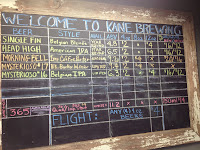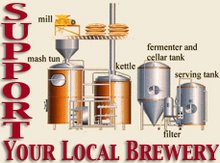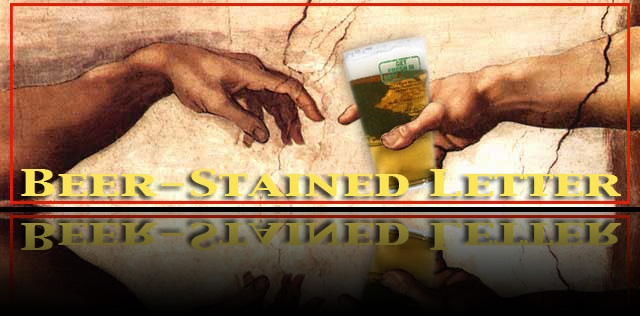Brewers and roasters, the quest for flavor
 |
| Kane's tasting room board |
Aside from being well worth your glass, they train a spotlight on a couple of New Jersey coffee roasters and underscore how the pursuit of great coffee mirrors the quest for good beer.
Rojo's Roastery, a must-stop for any flavor-seeker visiting Lambertville, lent its expertise to River Horse Brewing for a coffee turn on the brewery's oatmeal milk stout seasonal. The roaster worked with River Horse to select the right variety of coffee bean to give the the 6.7% ABV stout some added bounce. (See Rojo's coffees here.)
Likewise, Rook Coffee Roasters teamed with their neighbor, Kane Brewing in Ocean Township in Monmouth County, for a velvety infusion of cold-brewed Sumatra in an imperial porter, called Morning Bell, that rings the bell at 9.2% ABV.
 |
| Jamie Arnold and David Waldman |
 |
| Taphandle says it |
Rook, located about a half-mile from Kane, has the added distinction of plying the coffee craft in the building where Heavyweight Brewing produced artisanal beers before exiting New Jersey in 2006 to re-emerge as a brewpub under a new identity in Philadelphia.
"They're like-minded people," says Michael Kane, whose eponymous brewery took last year's St. Patrick's Day collaboration with Rook to the next level with Morning Bell. "What's important to them about their coffee is as important to us about our beer business here."
Such is the bond among artisans, says David Waldman, who opened Rojo's in a north-end neighborhood in Lambertville in 2006. "There's a mutual respect for the respective crafts we practice," he says.
Rojo's coffees are prepared from organic, fair trade beans with a 1956 Probat roaster, a machine that echoes a golden era of coffee bars (think Beat Generation and Jack Kerouac), a roaster that David can trace back to its only other owner in Lille, France. He lovingly rebuilt it for his shop and has declined requests from the manufacturer to buy it back for their museum. "This is what we do. We don't put them in a museum," David says. "We put them to work, as they're intended."
 |
| Holly and Shawn |
Founded by Shawn Kingsley and Holly Migliaccio, Rook opened three years ago with a small roaster in the Oakhurst community of Ocean Township. Another shop in Long Branch, a quick trip north, was added a little over a year later, as was the location near Kane, where the company's roasting of organic, fair trade coffees is done (on a new larger roaster) and their cold-brewed Sumatra coffee is made (Cornie-kegged and bottled) for their retail shops, including a new one in Little Silver. (Check out their coffees here.)
"Holly and I have an appreciation for anything craft. We love wines and beer and coffee," says Shawn. Collaborating with Kane "has been a great opportunity. They're in line with what we're focused on, which is craft, quality, service ..."
Says Holly: "It was such a great experience; our eyes were opened to the world of brewing beer. Then we found out that this particular location used to be a brewery."
Two worlds, single-minded passions
Coffee people move in a world that parallels their beer bretheren: Producers and aficionados are both drawn to exploring the global regions that are home to fine beers (Belgium, for instance) and beans (Costa Rica). And, among people who have experienced the rest, then became compelled to find – and/or make – the best, some overlap is inevitable.
Like coffee beer.
 |
| Coffee beans for roasting |
But that said, coffee in beer is hardly new. For that matter, neither is prevailing on local roasters to provide the beans. Yet, as a go-to beverage, coffee always suggests a new day, revisiting an old friend – or idea. Thus, the coffee-beer combination enjoys healthy representation among stouts and porters, even Irish reds. Plug the word "coffee" into BeerAdvocate's search engine, and you'll get nearly 300 beer-name hits, nearly 50 for "java". (That doesn't even count brews like Flying Dog's Cujo, which opt for less-linear names, like Morning Bell.)
Jersey brewers are wont to give their brews espresso expression, too. The list of Garden State coffee beers includes both brewpubs (Basil T's, Triumph, Long Valley, Iron Hill, and Tun Tavern) and production brewers (Tuckahoe's New Brighton Coffee Stout and Flying Fish's Imperial Coffee Porter, both using beans from roasters local to the breweries).
Barley and beans
At River Horse, jazzing up the oatmeal milk stout the brewery has been turning out since 2008 meant an opportunity to share some flavors the brewery staff appreciates at Rojo's in a one-off beer. (The stout is out now; check River Horse's Facebook page for availability. But hurry; it's a limited brew: Only about 60 barrels were produced.)
"It's phenomenal coffee. It's where we get our coffee from," says head brewer Chris Rakow.
 Chris teamed with Jamie Arnold, a roaster at Rojo's, to get the surest coffee flavor from the most complementary variety of bean. They chose a Guatemalan bean (Huehuetenango growing region) over Brazilian and Cost Rican, favoring its more harmonious tones and lower acidity; they opted for whole bean over a grind to minimize oxidation of the coffee and control how much coffee was imparted into the stout. They also decided to let the beer itself do some of the work post-fermentation.
Chris teamed with Jamie Arnold, a roaster at Rojo's, to get the surest coffee flavor from the most complementary variety of bean. They chose a Guatemalan bean (Huehuetenango growing region) over Brazilian and Cost Rican, favoring its more harmonious tones and lower acidity; they opted for whole bean over a grind to minimize oxidation of the coffee and control how much coffee was imparted into the stout. They also decided to let the beer itself do some of the work post-fermentation.
"The majority (of brewers), what they will do is cold-brew and add the coffee," Chris says. "What our idea was, instead of cold-brewing it with water and adding it in, we would age the coffee on the beans. Essentially, you're doing a cold-brew with the beer and not water."
The beans were roasted on a Monday, then added two days later to the beer in a conditioning tank, a proportion of 20 pounds per 40 barrels of beer.
"That also lends clarity to the finished product," Jamie says, "and this way, your window is a lot bigger, like when you're going to get the right amount of flavor added. The difference is in days."
Adding the cold-brewed coffee to the beer, though effective, wouldn't, for their palates, allow for the nuance they were seeking, Jamie says. "You're deciding right there how much coffee flavor is going in, and once it's in, it's in," he says.
The result of their efforts is a layered stout that unfolds with inviting coffee aroma and a friendly coffee flavor that doesn't overwhelm the beer, but rather, gently wakes it up.
"Next year I'd like to do a specific coffee beer with them. This was just real quick," Chris says. "We just decided to take one of our beers and age it on coffee. Next year, we might try to do a separate recipe for a coffee beer."
The question there was, how to revisit the success of last year's additions of Rook coffees, including their Sumatra, to create variations of their 6.2% ABV Port Omna Stout, done for a St. Patrick's Day tasting room event, without just repeating themselves (not that the brewery's fans would mind much).
The answer was go back to the drawing board. Michael explains the Kane-Rook collaboration's second act:
"People wanted us to do a coffee stout, or make more of that coffee stout. I really liked the way it came out, but I thought if we brewed a beer specifically with that coffee in mind, we could make it a little better than just adding coffee to the stout we'd already made.
"What I wanted to do was to make it a little bit different, make it a bigger beer, something that would stand up well to their Sumatra roast – the dark roast. We wanted to make it a porter base style to back off on the roasty malts that would have been in a stout, the roasted barley, the black patent – the darker roasts – and not have so much of that in the base beer.
"We thought it would be good to maybe pull a little bit from the milk stout category and pull in some of those unfermentable sugars, sweeten it up a little bit. We thought that would balance the roast and bold flavor of the coffee. We thought the higher alcohol, a bigger beer would stand up, because that's a pretty dark roast they use; we used a really concentrated version of that.
The brewery did three or four pilot batches, winding up using 15 gallons of the Sumatra cold brew in the porter. The result is a velvety porter, deep and flavorful. (Morning Bell came out the second week of January; check the brewery's Facebook page for availability and bars.)
That coffee in it, by the way, has a wide following among Rook's fans.
"It has a dark, syrupy tone to it, with chocolate notes," says Shawn. "We characterize it like dark chocolate. When you cold-brew it, it produces this concentrate, which is must less acidic than hot coffee ... When you mix it into something, it holds its flavor. Usually, when you have hot coffee poured over ice, it sometimes gets diluted. This is very smooth, very rich, very flavorful."
Rook and Kane landed on each other's radars via Nip-N-Tuck Bar & Grill in Long Branch. Holly and Shawn are friends of the owner, Bob Burtchaell. The bar's also one of Kane's draft accounts.
"We we first went to him and started pitching the beer to him, he brought up Rook, that they're really good people, and it's a local product," Michael says.
The same thing about Kane Brewing was pretty much happening in conversations Holly and Shawn had with Bob.
For the brewery, one that has sourced locally produced apple cider, hops and even yeast for some of its beers, Rook was another great find. What followed was a mutual appreciation and ultimately a friendship. And opportunities to work together.
"We had tasted their beer locally," Holly says, "and knew it was far superior than other things we'd tried. So we were very excited."
"And humbled," says Shawn.














